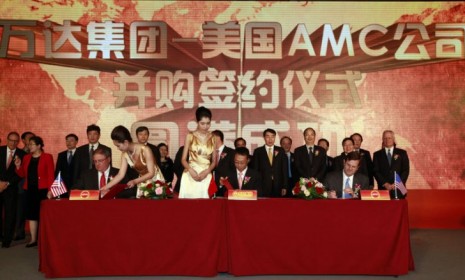Why a Chinese company is buying AMC movie theaters
With the addition of AMC's 5,000 screens, Dalian Wanda Group is now the world's largest theater operator. But was this really a smart acquisition?

A free daily email with the biggest news stories of the day – and the best features from TheWeek.com
You are now subscribed
Your newsletter sign-up was successful
China's Dalian Wanda Group is buying AMC Entertainment, America's second-largest chain of movie theaters, for a cool $2.6 billion. The deal marks the biggest Chinese takeover of an American company to date, and by adding AMC's 5,000 screens to its existing roster, Wanda will become the world's largest theater operator. The acquisition is just the latest step in an increasingly close relationship between China and Hollywood, though it usually works the other way, with Hollywood aggressively moving into China to take advantage of the country's expanding movie market. So what's Wanda up to? Here, a guide to the deal:
What does Wanda get from AMC?
The deal gives Wanda access to the North American movie market, which earned AMC more than $10 billion in ticket sales last year. And with Wanda's existing presence in China, where the company garners nearly 14 percent of the country's box-office revenues, the combined behemoth "could use its size to negotiate favorable terms with major Hollywood studios in the world's two largest film markets," say Richard Verrier and David Pierson at the Los Angeles Times.
The Week
Escape your echo chamber. Get the facts behind the news, plus analysis from multiple perspectives.

Sign up for The Week's Free Newsletters
From our morning news briefing to a weekly Good News Newsletter, get the best of The Week delivered directly to your inbox.
From our morning news briefing to a weekly Good News Newsletter, get the best of The Week delivered directly to your inbox.
Will more Chinese companies follow suit?
It's possible. Wanda's move could cause "a string of similar moves by other Chinese investors looking to diversify and raise their global profile," say Verrier and Pierson. Plus, buying big brand names helps Chinese companies enhance their prestige, much the way that Japanese companies in the 1980s and 1990s rose to prominence by buying Hollywood studios and valuable U.S. real estate, like Rockefeller Center and Pebble Beach.
Are there downsides to the deal?
Yes. The U.S. theater market is facing "competition from online diversions and stagnating ticket sales," say Michelle Kung and Ryan Dezember at The Wall Street Journal. Almost all the potential for growth lies in China and other emerging economies, making the deal something of a head-scratcher for industry analysts. Wanda could have bought AMC to learn from its "operational expertise," but it "could presumably have gotten expertise for less — by hiring theater executives or buying a smaller company," says Miriam Gottfried at The Wall Street Journal.
A free daily email with the biggest news stories of the day – and the best features from TheWeek.com
Is the Chinese government involved?
No. Wanda is a private company. But the ruling Communist Party views movies and other entertainment as a vehicle to spread Chinese influence abroad, and Wanda's entry into America is part of a national effort to become "as good at producing and exporting entertainment as it is computers and phones," says Jordan Weissmann at The Atlantic.
Will AMC start showing Chinese movies?
Not yet, though it could happen one day. "We serve a diverse audience," AMC Chief Financial Officer Craig Ramsey tells MSNBC. "There's a lot of Hispanic, a lot of African American, there's a lot of Asian. They like western products but they also like their own home-created products." Wanda Chairman Wang Jianlin, however, says the movie release decisions in the U.S. will be left entirely to American executives.
Sources: Associated Press, The Atlantic, The Los Angeles Times, MSNBC, The New York Times, The Wall Street Journal (2)